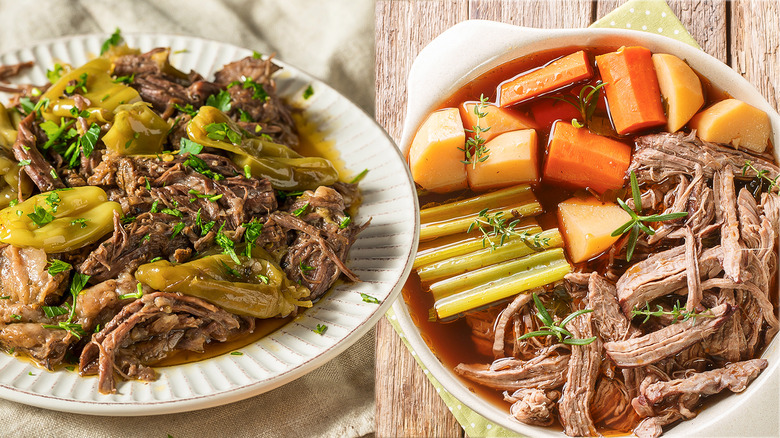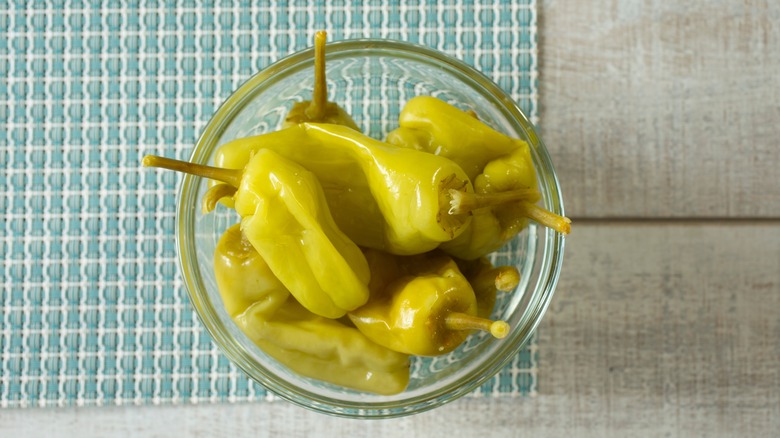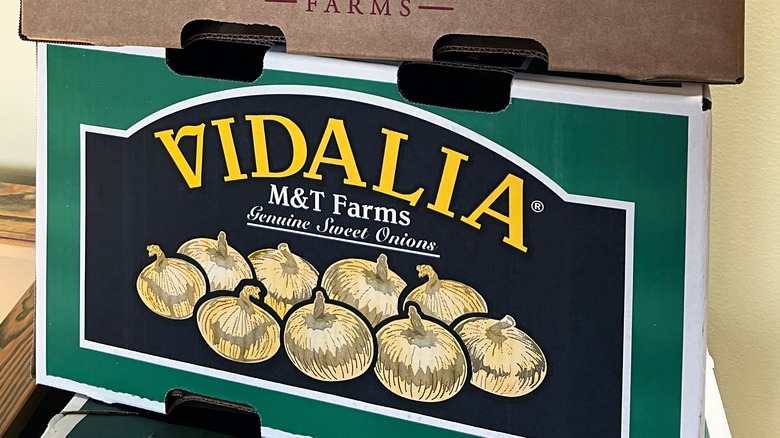Mississippi Vs Georgia Pot Roast: Is There A Difference?
It's easy to think of pot roast as a basic down-home dish with similar ingredients across the country, or maybe even throughout the globe. A lot is indeed the same, particularly the namesake beef ingredient in a warm, brothy liquid, often with vegetable pot-mates. But there is a difference in America's Deep South regions, where chefs are quick to tell you that "our" pot roast is not like "your" pot roast, even in the kitchens and diners of neighboring states. Mississippi and Georgia, separated only by the state of Alabama, are particularly protective of their pot roast distinctions.
As a Mississippi native with endless apron hours tied to regional recipes, I can say with all certainty that Mississippi pot roast is not the same as its Georgia counterpart. And there's no love lost for anyone saying otherwise. It doesn't matter that only one major ingredient separates the dueling kingpins of Southern roast territory — that's all it takes to substantially differentiate them. The crucial ingredient in the two fiercely territorial recipes is no secret, so I'll spill it upfront.
The Mississippi pot roast crucially involves pepperoncini peppers, while the Georgia roast bubbles to perfection alongside pickled Vidalia onions. As you can imagine, one is tangier than the other, and one adds a sweet touch to your dinner. Here's a closer look at how each one evolves within your stovetop pan or countertop slow cooker.
What makes a Mississippi pot roast different?
In many ways, Mississippi pot roast is a classic stewy wonder that comes together in a single pot. Just toss in the ingredients, set the heat level, and let the roast do its thing. The easiest hands-off method is using a slow cooker, whether a traditional Crock-Pot brand or any number of modern variants. What makes the dubbed Mississippi pot roast shine is the tangy touch of pepperoncini. These peppers land in the mild range of the heat, typically between 100 and 500 on the Scoville scale, comparable to a bell pepper.
But pepperoncini peppers typically come pickled in easily accessible jars, and that's where the unique flavor is born. As with most types of pickled vegetables, they bring a briny zing of vinegar to any recipe they enter. In Mediterranean countries such as Greece and Italy, they often can be found in salads. sandwiches, omelettes, and charcuterie boards. But in Mississippi, they shine particularly well in the state's namesake roast.
Chuck roast is compatible in structure and affordability, though rump roast works as well. The meat and pepperoncini, including the pepperoncini juice, join up with prepared packets of au jus gravy and ranch dressing mix. Some recipes, including a Mississippi roast by Tasting Table developer Christina Musgrave, diverge into packets of onion soup mix rather than au jus and add some unsalted butter for a creamy texture. You'll end up with a steamy, zingy, pungent roast that's refreshing and comforting at the same time.
What makes a Georgia pot roast different?
Georgia pot roast doesn't get the widespread attention of its Southern counterpart. But most Georgians aren't complaining, especially since the defining ingredient is available only from the state's soil and has a limited growing season. When mentioned in mainstream cooking venues, Georgia roast is often called a twist on the Mississippi version. Which one actually came first is hard to prove, but they're strikingly similar, apart from the starring pickled penetrator. Rather than pepperoncini defining this roast, it's a pickled version of sweet Vidalia onions.
To the uninitiated, sweet onions may all taste the same — but not if you're from Georgia. The Vidalia onion is a carefully guarded species grown only in a 20-county area of Georgia designated for growing. The soil harbors less sulfur than other onion crops, resulting in that telltale sweetness found nowhere outside the state. It's similar to how volcanic soils define sweet Maui onions. Vidalias proudly bear the title of official state vegetable, making it the obvious choice for Georgia pot roast.
When making a Georgia roast, you'll be ditching the pepperoncini for the pickled Vidalia onions — but everything else is essentially the same, including the au jus gravy and ranch dressing packets. Recipes vary slightly, some calling for extra beef stock or flour for thickening. Serving Georgia and Mississippi pot roasts is similar as well; dish it up for Sunday plate dinner, spoon it over rice or mashed potatoes, or shred the meat for a hoagie-style sandwich.


